ARTS1010: Revealing the Inner Life of Characters in Chekhov's Misery
VerifiedAdded on 2023/06/12
|7
|1747
|155
Essay
AI Summary
This essay delves into the inner lives of characters in Anton Chekhov's short story "Misery," focusing on the protagonist, Iona Potapov, a cab driver grieving the recent death of his son. The analysis explores how Iona's attempts to share his sorrow with passengers and others are met with indifference, highlighting his profound loneliness. The essay discusses the lack of emotional depth in the characters and the societal apathy depicted by Chekhov. Ultimately, Iona finds solace only in his horse, illustrating the theme of human disconnection and the desperate need for compassion in a world that often ignores individual suffering. The essay concludes that Chekhov's story effectively portrays the stark contrast between human indifference and the simple, comforting gestures of an animal.
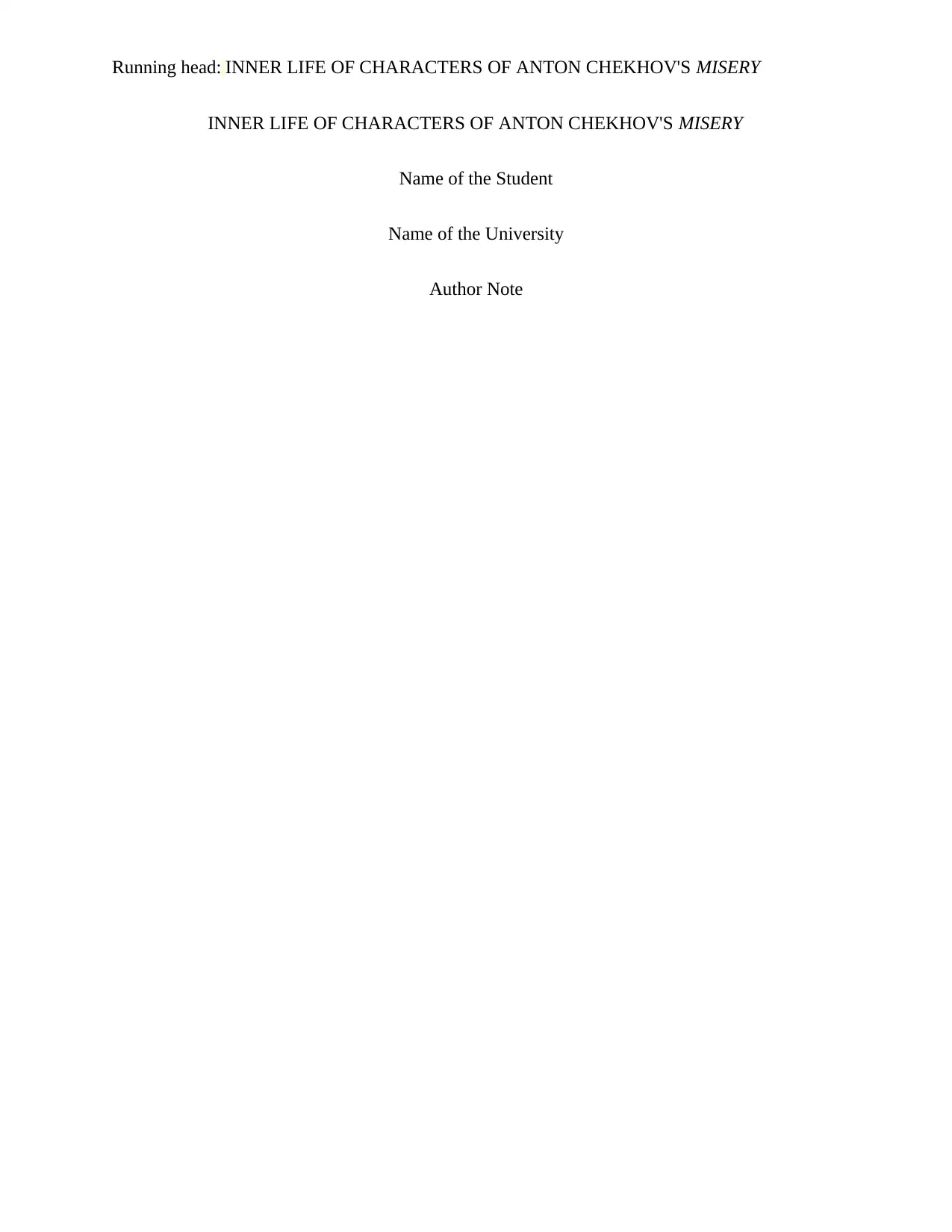
Running head: INNER LIFE OF CHARACTERS OF ANTON CHEKHOV'S MISERY
INNER LIFE OF CHARACTERS OF ANTON CHEKHOV'S MISERY
Name of the Student
Name of the University
Author Note
INNER LIFE OF CHARACTERS OF ANTON CHEKHOV'S MISERY
Name of the Student
Name of the University
Author Note
Paraphrase This Document
Need a fresh take? Get an instant paraphrase of this document with our AI Paraphraser
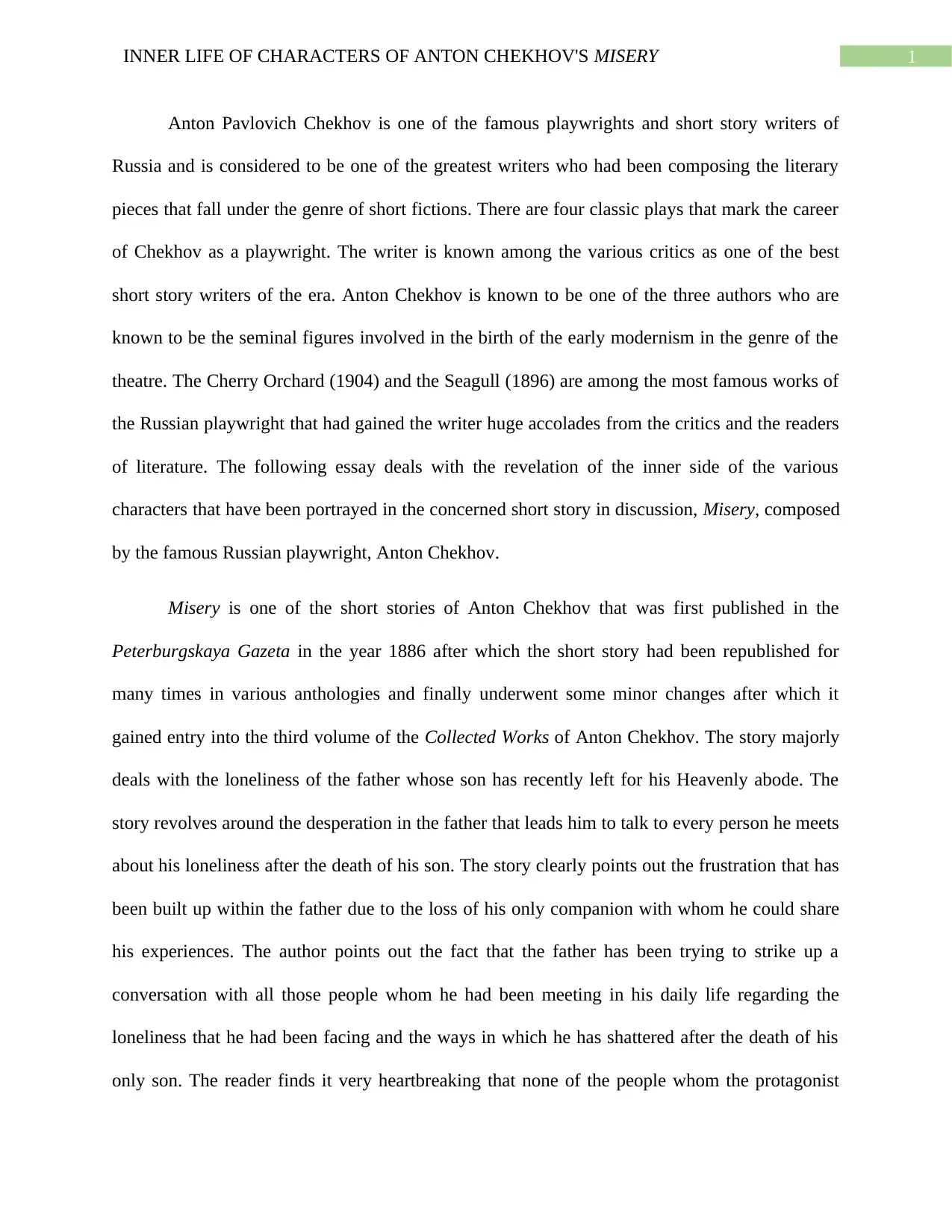
1INNER LIFE OF CHARACTERS OF ANTON CHEKHOV'S MISERY
Anton Pavlovich Chekhov is one of the famous playwrights and short story writers of
Russia and is considered to be one of the greatest writers who had been composing the literary
pieces that fall under the genre of short fictions. There are four classic plays that mark the career
of Chekhov as a playwright. The writer is known among the various critics as one of the best
short story writers of the era. Anton Chekhov is known to be one of the three authors who are
known to be the seminal figures involved in the birth of the early modernism in the genre of the
theatre. The Cherry Orchard (1904) and the Seagull (1896) are among the most famous works of
the Russian playwright that had gained the writer huge accolades from the critics and the readers
of literature. The following essay deals with the revelation of the inner side of the various
characters that have been portrayed in the concerned short story in discussion, Misery, composed
by the famous Russian playwright, Anton Chekhov.
Misery is one of the short stories of Anton Chekhov that was first published in the
Peterburgskaya Gazeta in the year 1886 after which the short story had been republished for
many times in various anthologies and finally underwent some minor changes after which it
gained entry into the third volume of the Collected Works of Anton Chekhov. The story majorly
deals with the loneliness of the father whose son has recently left for his Heavenly abode. The
story revolves around the desperation in the father that leads him to talk to every person he meets
about his loneliness after the death of his son. The story clearly points out the frustration that has
been built up within the father due to the loss of his only companion with whom he could share
his experiences. The author points out the fact that the father has been trying to strike up a
conversation with all those people whom he had been meeting in his daily life regarding the
loneliness that he had been facing and the ways in which he has shattered after the death of his
only son. The reader finds it very heartbreaking that none of the people whom the protagonist
Anton Pavlovich Chekhov is one of the famous playwrights and short story writers of
Russia and is considered to be one of the greatest writers who had been composing the literary
pieces that fall under the genre of short fictions. There are four classic plays that mark the career
of Chekhov as a playwright. The writer is known among the various critics as one of the best
short story writers of the era. Anton Chekhov is known to be one of the three authors who are
known to be the seminal figures involved in the birth of the early modernism in the genre of the
theatre. The Cherry Orchard (1904) and the Seagull (1896) are among the most famous works of
the Russian playwright that had gained the writer huge accolades from the critics and the readers
of literature. The following essay deals with the revelation of the inner side of the various
characters that have been portrayed in the concerned short story in discussion, Misery, composed
by the famous Russian playwright, Anton Chekhov.
Misery is one of the short stories of Anton Chekhov that was first published in the
Peterburgskaya Gazeta in the year 1886 after which the short story had been republished for
many times in various anthologies and finally underwent some minor changes after which it
gained entry into the third volume of the Collected Works of Anton Chekhov. The story majorly
deals with the loneliness of the father whose son has recently left for his Heavenly abode. The
story revolves around the desperation in the father that leads him to talk to every person he meets
about his loneliness after the death of his son. The story clearly points out the frustration that has
been built up within the father due to the loss of his only companion with whom he could share
his experiences. The author points out the fact that the father has been trying to strike up a
conversation with all those people whom he had been meeting in his daily life regarding the
loneliness that he had been facing and the ways in which he has shattered after the death of his
only son. The reader finds it very heartbreaking that none of the people whom the protagonist
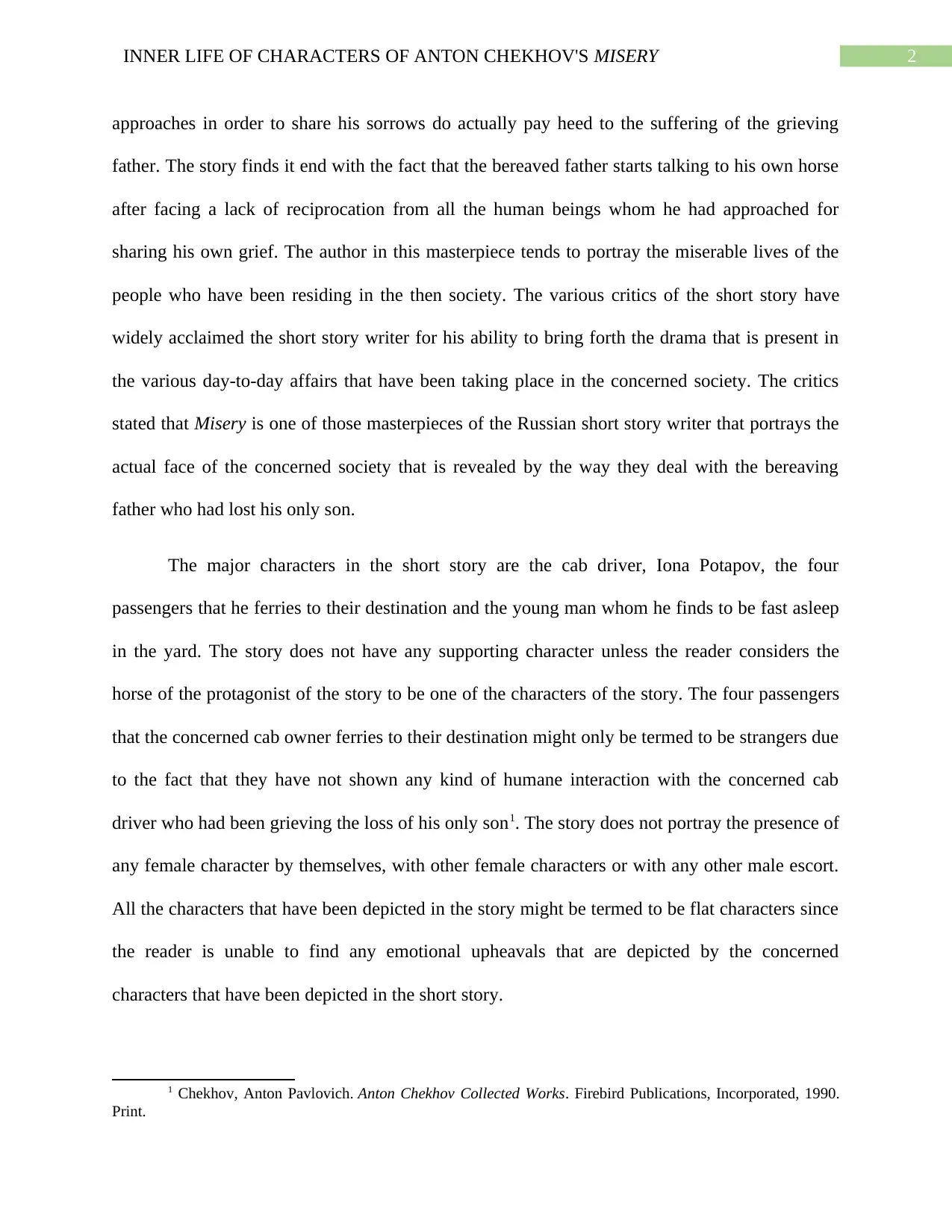
2INNER LIFE OF CHARACTERS OF ANTON CHEKHOV'S MISERY
approaches in order to share his sorrows do actually pay heed to the suffering of the grieving
father. The story finds it end with the fact that the bereaved father starts talking to his own horse
after facing a lack of reciprocation from all the human beings whom he had approached for
sharing his own grief. The author in this masterpiece tends to portray the miserable lives of the
people who have been residing in the then society. The various critics of the short story have
widely acclaimed the short story writer for his ability to bring forth the drama that is present in
the various day-to-day affairs that have been taking place in the concerned society. The critics
stated that Misery is one of those masterpieces of the Russian short story writer that portrays the
actual face of the concerned society that is revealed by the way they deal with the bereaving
father who had lost his only son.
The major characters in the short story are the cab driver, Iona Potapov, the four
passengers that he ferries to their destination and the young man whom he finds to be fast asleep
in the yard. The story does not have any supporting character unless the reader considers the
horse of the protagonist of the story to be one of the characters of the story. The four passengers
that the concerned cab owner ferries to their destination might only be termed to be strangers due
to the fact that they have not shown any kind of humane interaction with the concerned cab
driver who had been grieving the loss of his only son1. The story does not portray the presence of
any female character by themselves, with other female characters or with any other male escort.
All the characters that have been depicted in the story might be termed to be flat characters since
the reader is unable to find any emotional upheavals that are depicted by the concerned
characters that have been depicted in the short story.
1 Chekhov, Anton Pavlovich. Anton Chekhov Collected Works. Firebird Publications, Incorporated, 1990.
Print.
approaches in order to share his sorrows do actually pay heed to the suffering of the grieving
father. The story finds it end with the fact that the bereaved father starts talking to his own horse
after facing a lack of reciprocation from all the human beings whom he had approached for
sharing his own grief. The author in this masterpiece tends to portray the miserable lives of the
people who have been residing in the then society. The various critics of the short story have
widely acclaimed the short story writer for his ability to bring forth the drama that is present in
the various day-to-day affairs that have been taking place in the concerned society. The critics
stated that Misery is one of those masterpieces of the Russian short story writer that portrays the
actual face of the concerned society that is revealed by the way they deal with the bereaving
father who had lost his only son.
The major characters in the short story are the cab driver, Iona Potapov, the four
passengers that he ferries to their destination and the young man whom he finds to be fast asleep
in the yard. The story does not have any supporting character unless the reader considers the
horse of the protagonist of the story to be one of the characters of the story. The four passengers
that the concerned cab owner ferries to their destination might only be termed to be strangers due
to the fact that they have not shown any kind of humane interaction with the concerned cab
driver who had been grieving the loss of his only son1. The story does not portray the presence of
any female character by themselves, with other female characters or with any other male escort.
All the characters that have been depicted in the story might be termed to be flat characters since
the reader is unable to find any emotional upheavals that are depicted by the concerned
characters that have been depicted in the short story.
1 Chekhov, Anton Pavlovich. Anton Chekhov Collected Works. Firebird Publications, Incorporated, 1990.
Print.
⊘ This is a preview!⊘
Do you want full access?
Subscribe today to unlock all pages.

Trusted by 1+ million students worldwide
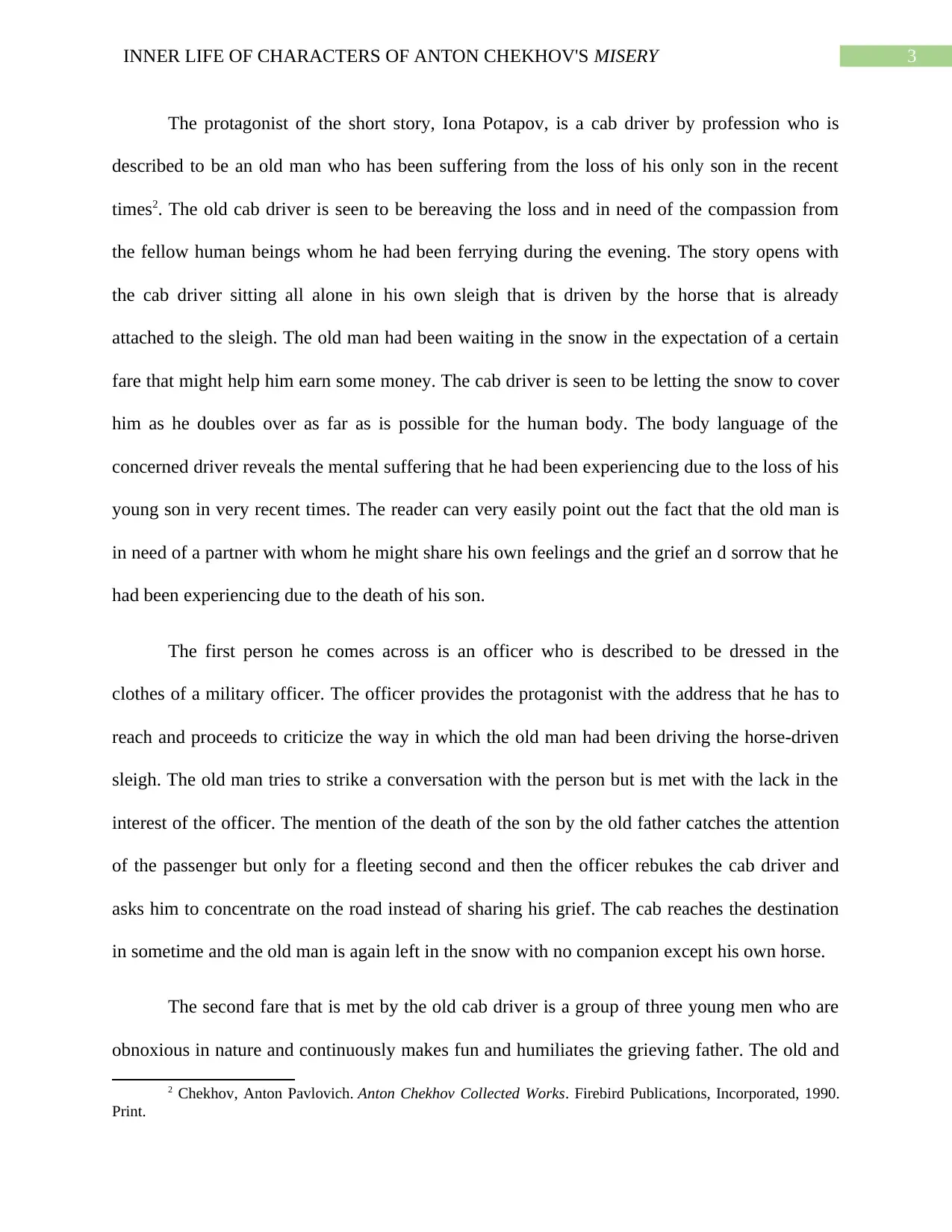
3INNER LIFE OF CHARACTERS OF ANTON CHEKHOV'S MISERY
The protagonist of the short story, Iona Potapov, is a cab driver by profession who is
described to be an old man who has been suffering from the loss of his only son in the recent
times2. The old cab driver is seen to be bereaving the loss and in need of the compassion from
the fellow human beings whom he had been ferrying during the evening. The story opens with
the cab driver sitting all alone in his own sleigh that is driven by the horse that is already
attached to the sleigh. The old man had been waiting in the snow in the expectation of a certain
fare that might help him earn some money. The cab driver is seen to be letting the snow to cover
him as he doubles over as far as is possible for the human body. The body language of the
concerned driver reveals the mental suffering that he had been experiencing due to the loss of his
young son in very recent times. The reader can very easily point out the fact that the old man is
in need of a partner with whom he might share his own feelings and the grief an d sorrow that he
had been experiencing due to the death of his son.
The first person he comes across is an officer who is described to be dressed in the
clothes of a military officer. The officer provides the protagonist with the address that he has to
reach and proceeds to criticize the way in which the old man had been driving the horse-driven
sleigh. The old man tries to strike a conversation with the person but is met with the lack in the
interest of the officer. The mention of the death of the son by the old father catches the attention
of the passenger but only for a fleeting second and then the officer rebukes the cab driver and
asks him to concentrate on the road instead of sharing his grief. The cab reaches the destination
in sometime and the old man is again left in the snow with no companion except his own horse.
The second fare that is met by the old cab driver is a group of three young men who are
obnoxious in nature and continuously makes fun and humiliates the grieving father. The old and
2 Chekhov, Anton Pavlovich. Anton Chekhov Collected Works. Firebird Publications, Incorporated, 1990.
Print.
The protagonist of the short story, Iona Potapov, is a cab driver by profession who is
described to be an old man who has been suffering from the loss of his only son in the recent
times2. The old cab driver is seen to be bereaving the loss and in need of the compassion from
the fellow human beings whom he had been ferrying during the evening. The story opens with
the cab driver sitting all alone in his own sleigh that is driven by the horse that is already
attached to the sleigh. The old man had been waiting in the snow in the expectation of a certain
fare that might help him earn some money. The cab driver is seen to be letting the snow to cover
him as he doubles over as far as is possible for the human body. The body language of the
concerned driver reveals the mental suffering that he had been experiencing due to the loss of his
young son in very recent times. The reader can very easily point out the fact that the old man is
in need of a partner with whom he might share his own feelings and the grief an d sorrow that he
had been experiencing due to the death of his son.
The first person he comes across is an officer who is described to be dressed in the
clothes of a military officer. The officer provides the protagonist with the address that he has to
reach and proceeds to criticize the way in which the old man had been driving the horse-driven
sleigh. The old man tries to strike a conversation with the person but is met with the lack in the
interest of the officer. The mention of the death of the son by the old father catches the attention
of the passenger but only for a fleeting second and then the officer rebukes the cab driver and
asks him to concentrate on the road instead of sharing his grief. The cab reaches the destination
in sometime and the old man is again left in the snow with no companion except his own horse.
The second fare that is met by the old cab driver is a group of three young men who are
obnoxious in nature and continuously makes fun and humiliates the grieving father. The old and
2 Chekhov, Anton Pavlovich. Anton Chekhov Collected Works. Firebird Publications, Incorporated, 1990.
Print.
Paraphrase This Document
Need a fresh take? Get an instant paraphrase of this document with our AI Paraphraser
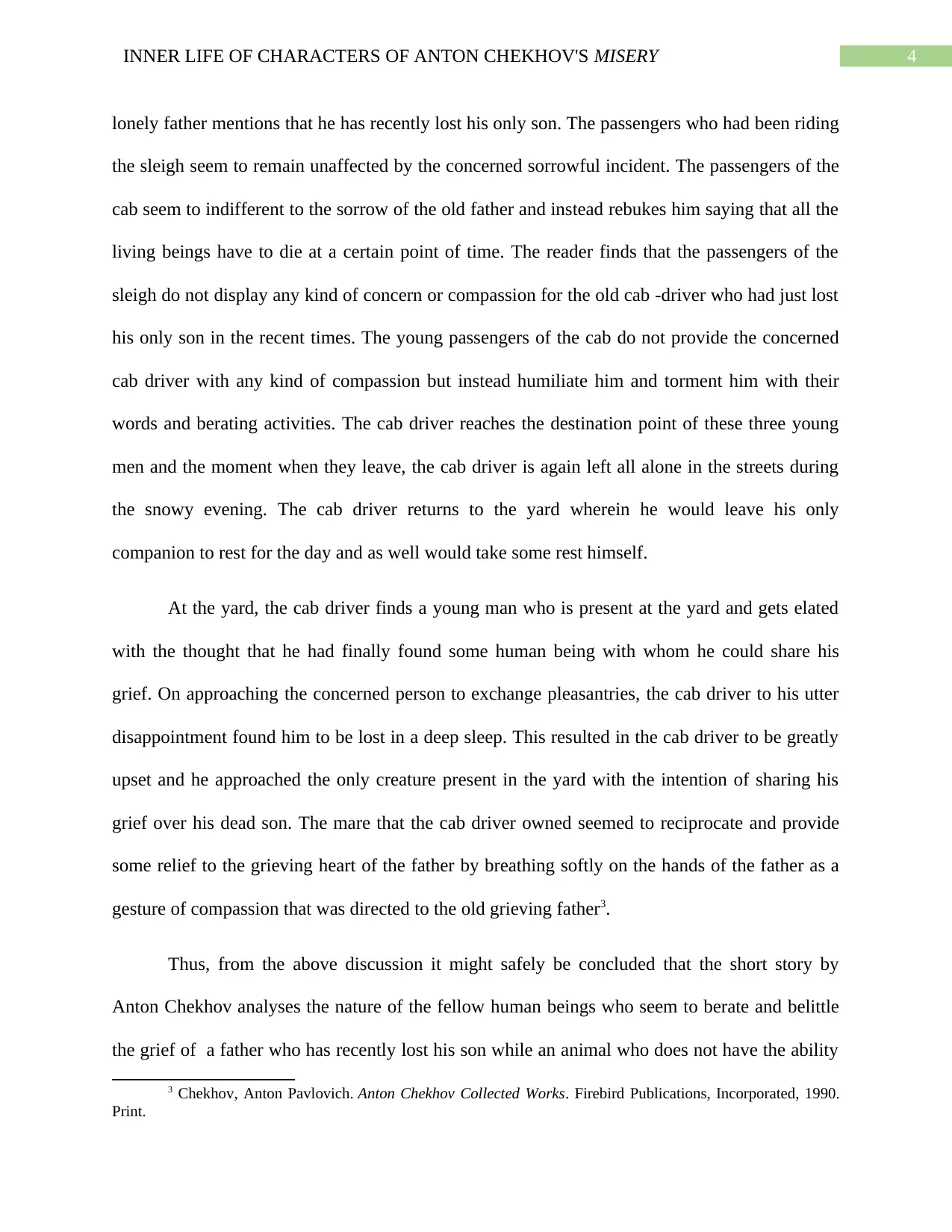
4INNER LIFE OF CHARACTERS OF ANTON CHEKHOV'S MISERY
lonely father mentions that he has recently lost his only son. The passengers who had been riding
the sleigh seem to remain unaffected by the concerned sorrowful incident. The passengers of the
cab seem to indifferent to the sorrow of the old father and instead rebukes him saying that all the
living beings have to die at a certain point of time. The reader finds that the passengers of the
sleigh do not display any kind of concern or compassion for the old cab -driver who had just lost
his only son in the recent times. The young passengers of the cab do not provide the concerned
cab driver with any kind of compassion but instead humiliate him and torment him with their
words and berating activities. The cab driver reaches the destination point of these three young
men and the moment when they leave, the cab driver is again left all alone in the streets during
the snowy evening. The cab driver returns to the yard wherein he would leave his only
companion to rest for the day and as well would take some rest himself.
At the yard, the cab driver finds a young man who is present at the yard and gets elated
with the thought that he had finally found some human being with whom he could share his
grief. On approaching the concerned person to exchange pleasantries, the cab driver to his utter
disappointment found him to be lost in a deep sleep. This resulted in the cab driver to be greatly
upset and he approached the only creature present in the yard with the intention of sharing his
grief over his dead son. The mare that the cab driver owned seemed to reciprocate and provide
some relief to the grieving heart of the father by breathing softly on the hands of the father as a
gesture of compassion that was directed to the old grieving father3.
Thus, from the above discussion it might safely be concluded that the short story by
Anton Chekhov analyses the nature of the fellow human beings who seem to berate and belittle
the grief of a father who has recently lost his son while an animal who does not have the ability
3 Chekhov, Anton Pavlovich. Anton Chekhov Collected Works. Firebird Publications, Incorporated, 1990.
Print.
lonely father mentions that he has recently lost his only son. The passengers who had been riding
the sleigh seem to remain unaffected by the concerned sorrowful incident. The passengers of the
cab seem to indifferent to the sorrow of the old father and instead rebukes him saying that all the
living beings have to die at a certain point of time. The reader finds that the passengers of the
sleigh do not display any kind of concern or compassion for the old cab -driver who had just lost
his only son in the recent times. The young passengers of the cab do not provide the concerned
cab driver with any kind of compassion but instead humiliate him and torment him with their
words and berating activities. The cab driver reaches the destination point of these three young
men and the moment when they leave, the cab driver is again left all alone in the streets during
the snowy evening. The cab driver returns to the yard wherein he would leave his only
companion to rest for the day and as well would take some rest himself.
At the yard, the cab driver finds a young man who is present at the yard and gets elated
with the thought that he had finally found some human being with whom he could share his
grief. On approaching the concerned person to exchange pleasantries, the cab driver to his utter
disappointment found him to be lost in a deep sleep. This resulted in the cab driver to be greatly
upset and he approached the only creature present in the yard with the intention of sharing his
grief over his dead son. The mare that the cab driver owned seemed to reciprocate and provide
some relief to the grieving heart of the father by breathing softly on the hands of the father as a
gesture of compassion that was directed to the old grieving father3.
Thus, from the above discussion it might safely be concluded that the short story by
Anton Chekhov analyses the nature of the fellow human beings who seem to berate and belittle
the grief of a father who has recently lost his son while an animal who does not have the ability
3 Chekhov, Anton Pavlovich. Anton Chekhov Collected Works. Firebird Publications, Incorporated, 1990.
Print.

5INNER LIFE OF CHARACTERS OF ANTON CHEKHOV'S MISERY
to express the feelings or provide the needed compassion through the medium of speech tends to
relate to the grief of the humans by simple gestures and display of certain gestures.
to express the feelings or provide the needed compassion through the medium of speech tends to
relate to the grief of the humans by simple gestures and display of certain gestures.
⊘ This is a preview!⊘
Do you want full access?
Subscribe today to unlock all pages.

Trusted by 1+ million students worldwide

6INNER LIFE OF CHARACTERS OF ANTON CHEKHOV'S MISERY
References
Chekhov, Anton Pavlovich. Anton Chekhov Collected Works. Firebird Publications,
Incorporated, 1990. Print.
References
Chekhov, Anton Pavlovich. Anton Chekhov Collected Works. Firebird Publications,
Incorporated, 1990. Print.
1 out of 7
Related Documents
Your All-in-One AI-Powered Toolkit for Academic Success.
+13062052269
info@desklib.com
Available 24*7 on WhatsApp / Email
![[object Object]](/_next/static/media/star-bottom.7253800d.svg)
Unlock your academic potential
Copyright © 2020–2026 A2Z Services. All Rights Reserved. Developed and managed by ZUCOL.





